-

人教版新目标初中英语九年级下册Rainy days make me sad教案
1. 教材分析本单元以how do things affect you?为话题, 从颜色、天气、音乐、广告、产品等方面谈论了外界事物如何影响人的心情。要求学生掌握表达某物或某事给人带来的感觉、看法或影响等。共设计了四个部分的内容:Section A 该部分有4个模块:第一模块围绕Which restaurant would you like to go to?这一话题展开思维(1a)、听力(1b)、口语(1c)训练;第二模块围绕How does music affect you? 进行听力(2a-2b)、口语训练(2c);第三模块继续围绕how do colors in the restaurant affect you这一话题展开训练,训练形式为阅读和问题体验(3a)和小组活动(3b);第四模块仍就How do things affect you这一话题以调查的形式展开讨论。Section B该部分有4个模块:第一模块围绕产品广告对人们的影响这一话题以“配对”(1a)与“列举”(1b)两种形式展开训练;第二模块继续围绕How do things affect you? 进行听力(2a-2b)、口语对话训练(2c);第三模块围绕“Advertising”这一话题展开阅读(3a-3b)和写作(3c)训练;第四模块围绕How posters affect you这一话题以口语训练形式展开小组活动。

人教版新目标初中英语九年级下册Could you please tell me where the restrooms are教案
Step Ⅰ RevisionCheck homework. Ask a few students to read the article in 3a.Then ask a few students to read their guides.Step Ⅱ Part 1Look at the words in the box. Ask a student to read them. Make sure the students understand the meaning of the words. You are to fill in the blanks with the words. In some cases, students may need to use another form of the word, for example adjusting for tense or subject/ verb agreement.Ask students to fill in the blanks on their own.Check the answers. Step ⅢPart 2Go through the instructions with the class.Look at the example with the students.Ask students what the answer would be.Ask a student to read the question and answer it.Excuse me, could you tell me where the bank is, please?The bank is across the street from the shopping malt.Get students to complete the work in pairs.Check the answers. Ask a few students to read their questions.Step Ⅳ Just for Fun!Ask all the students to read the conversation. Ask: What is funny about this cartoon? Help students to explain. A Martian is a person from the planet Mars.There is no such thing as Martian food on Earth, and the clerk looks silly because he is trying to think of where there is a Martian restaurant.Invite some pairs of students to present this conversation to the rest of the class.Step Ⅴ Summary and HomeworkIn this class, we’ve done much writing practice using the key vocabulary words and the target language presented in this unit. After class, please finish the questions in 2 in your exercise books. Then finish the exercises on pages 47~48 of the workbook as well.The Seventh Period Ⅰ Teaching Aims and Demands1. Knowledge Objects(1) Key Vocabularyimage, adventure, jealousy, hero, crime, journey, brave, no longer, show interest in, take it easy, become interested in, plain looks(2)Text:Grown-ups like cartoons, too.2. Ability Objects(1) Fast-reading to get a general idea of the text.(2) Careful-reading to get the detailed information in the text.

人教版新目标初中英语九年级下册I’ll help clean up the city parks教案
Talk about offering help (P60)I’ll help clean up the city parks.A: I’d like to work ...B: You could help ...Talk about ways to tell people about the Clean-Up Day (P61)We need to ...We can’t ...I’ll ...Talk about the work the volunteers do (P62)These three students all volunteer their time to help other people.Somebody loves to ... / helps ... / plans to ... / wants to ...A: What do you like doing?B: I like ... A: What kind of volunteer work do you think I could do?B: You could ...1. 重点词汇advertisement, fix, repair, pleasure, blind, deaf, shut, carry, specially, fetch2. 认读词汇hunger, homeless, cheer, clean-up, sign, establish, major, commitment, elementary, veterinarian, coach, similar, call-in, strategy, disabled, organization, unable, support, appreciate, donation, part of speech, pronoun, adverb, preposition, conjunction, donate, Jimmy, Sally3. 词组clean up, cheer up, give out, put off, set up, think up, take after, fix up, give away, put up, hand out, work out, at once

人教版新目标初中英语九年级下册We’re trying to save the manatees教案2篇
本单元主要围绕着有关濒临灭绝的动物这一话题,学习了应该怎样保护我们的环境,以及就某一问题展开辩论。目标提示语言目标能够运用所学知识,就某一问题展开辩论。认知目标1、复习一些语法:现在进行时、一般现在时、用used to 表示一般过去时、现在完成时、一般过去时的被动语态。2、学会表达同意和不同意。3、学会以下基本句型:We’re trying to save the manatees.Manatees eat about 100 pounds of food a day.There used to be a lot of manatees.In 1972,it was discovered that they were endangered.Some of the swamps have become polluted.情感目标了解一些濒临灭绝的动物的生活习性和濒临灭绝的原因,教育学生应该如何保护环境。教学提示充分利用多媒体等教学设备,创设与本课话题相关的情境,如各种不同种类的动物、动物园以及有关环境的画画等等。围绕着本单元的教学目标,设计一些贴近学生实际的教学任务,如让学生谈论自己最喜欢的动物,如何拯救濒危动物,如何保护环境等等。让学生根据所学知识,就动物园是否对动物有利以及其他的话题进行辩论。

人教版新目标初中英语九年级下册You’re supposed to shake hands教案
教学目标:1. 掌握本单元一些重点词汇的写法和用法。2. 学会自如谈论餐桌礼仪。Step 1 RevisionAsk some students to retell the customs at the table in France in the passage in 3a.Step 2 Self checkPart 1. Fill in each bland with the correct word given. Students do the exercises by themselves at first. Then check the answers. Ask the students to comprehend the sentences and help them point out uses of some words, like “arrive (at / in) sw., spend time / money on sth , spend time / money (in) doing sth.”Part 2. Read about Fan Ling’s experience in a western restaurant. Understand the passage. Point out some key points in the passage.1. be / get used to doing sth. 习惯做某事2. begin with = start with 以….开头3. crowd v. 挤满,塞满 the crowd 人群 crowded adj. 拥挤的Then students discuss about how she would solve her problem. Ask some to share their stories with others.Part 3. Complete the crossword by looking at the sentences on the left. Then check the answers.

新人教版高中英语必修1Unit 1 Teenage Life-Listening and Speaking & Listening and Talking教案
Step 2 Listening and Talking1. The teacher is advised to talk with their new students about the related topic: Boys and girls, do you know some structures to talk about future activities? Talking about future activitiesWe’ll …I plan to …There’ll be …I hope to …We’re going to …2. After their small talk, the teacher can move on by playing the listening and solve the following task.Underline the expressions in the sentences below Cao Jing and Max use to talk about the future.We’ll learn useful skills.I plan to improve my spoken English.There’ll be students from different schools.I hope to make new friends.We’ll talk about teenage life.I’ll learn to make a fire.There’ll be students from different countries at the camp.There’ll be some experts there to show us how to live in the wild.We’re going to learn about wildlife.I’m going to give a speech.I think I’m going to enjoy the activities.I think we’ll have a lot of fun.3. Work in groups. Plan a youth camp.Teacher make the Ss think of ideas for the camp. And they can use the questions below to get started. And have the Ss present their ideas for a youth camp to the class.●What kind of camp is it?●Who will be there?●What will they do?●What will they learn?

新人教版高中英语必修1Unit 2 Travelling Around-Listening and Speaking & Listening and Talking教案
【教学目标与核心素养】1. Instruct students to get main facts by listening and motivate them to talk about the topics about how to prepare for the trip and make reservations by listening and ultimately can make travel arrangements and reservations. 2. Develop students’ sense of cooperative learning and individual thinking capability. 3. Develop students’ different listening skills to solve different listening comprehensive problems.4. Help students to understand how to use the structures “the present continuous tense (be doing) is used to express future plans.【教学重难点】1. Teach students how to focus on key words, not on single words or grammar.2. Prompt Ss to talk about the related topics, such as how to prepare for the trip and make a travel plan.【教学过程】Step 1: Listening and SpeakingLead inThe teacher is advised to talk with their students about the places that they want to travel most both at home and abroad: boys and girls, if you have a chance to travel around the world, where will you go? After their small talk, the teacher can move on by finishing the following listening task:Before travelling, what do we need to prepare for the trip?

新人教版高中英语必修1Unit 3 Sports and Fitness-Listening and Speaking & Listening and Talking教案
Finally, after finishing the task above, the teacher is expected to instruct students to work in groups to finish the following project:Speaking ProjectWhat event or activity would you like to invite your friend to? Make a conversation with a partner.Ski Race: Zhangjiakou, a beautiful city in northern China, will host the Youth Ski Race in December.Track Meet: a great event for track –and –field lovers on 26 October.Gym Class: come and work out at a gym! You can make it.Part 2: Listening and Talking:The teacher is advised to talk with their new students about the related topic: Boys and girls , what do you think of sportsmanship? Let’s listen and find out:Play the listening and match each opinion with the right speaker. Who do you agree with? Why?Cao Jing _____________ Lily _____________ Max _____________A. An athlete should do his/her best to win.B. The girl should stop and help the other girl. Good sportsmanship is more important than wining!C. An athlete should think about honor and his/her fans if he/she is competing for his/her country.Listen again and circle the expressions that you hear in the conversation.

新人教版高中英语必修1Unit 3 Sports and Fitness- Discovering Useful Structures—tag questions教案
【教材分析】This teaching period mainly deals with the grammar: tag questions.This period carries a considerable significance to the cultivation of students’ spoken English. The teacher is expected to enable students to master this period thoroughly and consolidate the knowledge by doing some exercise of good quality.【教学目标与核心素养】1. Get students to have a good understanding of the basic usages of tag questions.2. Enable students to use the basic phrases structures flexibly.3. Develop students’ speaking and cooperating abilities.4. Strengthen students’ great interest in grammar learning.【教学重难点】1. How to enable students to have a good understanding of the basic usages of tag questions.2. How to enable students to use the basic usages of tag questions flexibly.【教学过程】Step1: 语法自主探究一、基本组成方法1.肯定式陈述部分+否定附加疑问部分(前肯后否) You often play badminton, don’t you? 你经常打羽毛球,是吗?You are going to the gym with me, aren’t you?你要和我一起去健身房,是吗?She’s been to shanghai before, hasn’t she? 她以前去过上海,是吗?2.否定式陈述部分+肯定附加疑问部分(前否后肯) It isn't a beautiful flower, is it? 那不是美丽的花,是吗?You didn't go skating yesterday, did you? 你昨天没去滑冰,是吗?They can’t finish it by Friday, can they?他们不能在星期五之前完成,是吗?
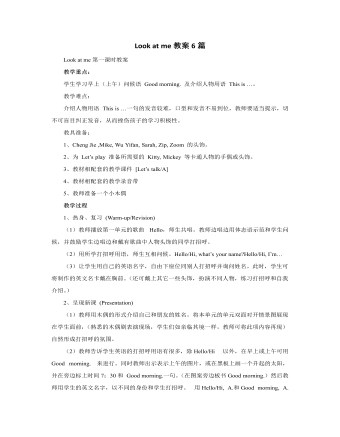
人教版新课标PEP小学英语三年级上册Look at me教案6篇
1.小组学习法全班分成各个部位,以半弧形状摆设,不仅拉近了师生、同学间的距离,便于口语交际和合作学习,而且让学生在独立与合作的交织中变得大胆、自信。2)Learning by singing, chanting, playing, touching.通过这些活动激发学生学习英语的兴趣,帮助他们建立学习的成就感和自信心。四.教学步骤英语课程的学习即是学生通过英语学习和实践活动逐步掌握语言知识,技能,提高实际运用能力的过程,又是他们陶冶情操,拓宽视野形成有效学习策略的过程。整个教学我设计了复习——新知展示——练习——小结及作业布置四个步骤。一.Warm-up1.Geetings2.SingasongT:Do you like to sing a song?Ss: Yes.T: Now, Let’s sing as ong,OK?Ss:OK. 【教师和学生一起边拍手边唱这首歌,不仅复习前面的打招呼语,而且把学生拉回到英语课堂,活跃了课堂的氛围,增加学生的学习兴趣】3.guessinggameT: Good. Look at me, What’s in my hand ?【教师拿出一个书包,书包内装入了各种学过的文具和一个玩具人头,让学生感到新奇,从而增强兴趣】
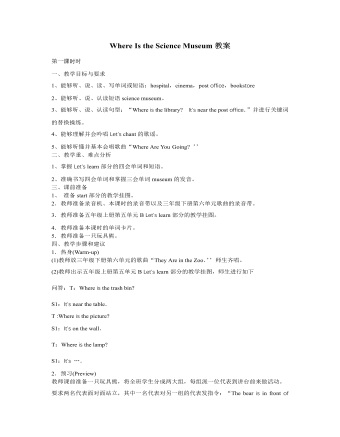
人教版新课标PEP小学英语六年级上册Where Is the Science Museum教案
3.新课呈现(Presentation) (1)教师将Let’s talk部分的教学挂图贴在黑板上说“1 want t0 go to the post office。。 Where is the post office? ”引导学生回答:“It’s east/west/south/north of …。? 接着让学生看挂图,利用图上出现的场所替换关键词进行问答。? (2)“爱我中华”活动 学生两人一组准备一张中国地图,进行问答,如:“Where is Jiangxi? It’s east 0f Hunan.It’s west of Zhejiang.It’s south of Anhui.It’s north of Guangdong.”等。 (3)教师将学生分成六组,仿照教学挂图所示位置,把六张单词卡片(hospital,bookstore,park,post office,cinema,sch001)分发给各组,然后教师站在图中Amy 的位置上,说:I want to go to the hospital.Where is it? ”学生会说:“It’s east of the park.’’教师再问:“How can I get there? ”引导学生说:“Turn left affil the cinema,and go straight.Then turn right at the post office and go straight-It’s on the left.”学生跟读并进行一系列的替换练习。 (4)教师放B Let’s talk部分的录音,学生跟读。 (5)学生两人一组,看地图,替换句型中的关键词自编对话,请几组学生表演对话。
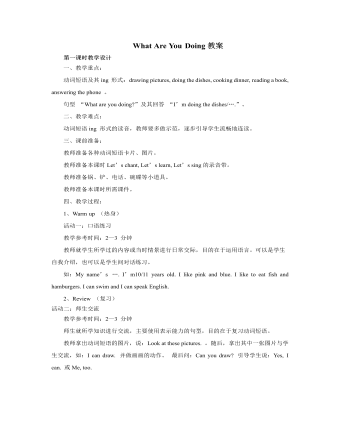
人教版新课标PEP小学英语五年级下册What Are You Doing教案
教学参考时间:2—3分钟教师让学生说出几个家庭成员名称,如:father, mother, sister, brother, uncle等,自己或让学生把单词写在黑板的一侧,再让学生说出几个动词短语的-ing形式,如:washing clothes, writing an e-mail, watching TV等,写到黑板的另一侧。学生在家庭成员名称和动词短语中分别选三至四个,自己编成一首歌谣。课后,可以让学生将创作的歌谣进行展示或举行歌谣朗读比赛。5、Consolidation and extension (扩展活动)活动十:知识扩展教学参考时间:1—2 分钟教师让学生打开书第54页Good to know 部分,了解主要国家的紧急救助电话。如:美国,英国,加拿大,澳大利亚等。教师还帮助学生了解我国的紧急救助电话号码。教师可以利用道具电话让学生做游戏。活动十一:练一练教学参考时间:2—3 分钟做本单元B Let’s talk部分的活动手册第37页的配套练习。教师讲解题目要求。教师播放录音,做Listen and number 部分练习。要求按所听内容在图上写出序号。再次播放,让学生按录音内容填空。鼓励学生自己读读所写句子。
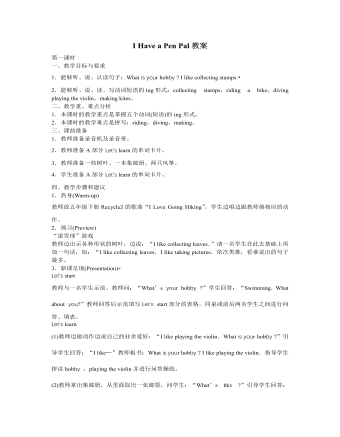
人教版新课标PEP小学英语六年级上册I Have a Pen Pal教案
(1)教师说:“Zhang Peng’s mother is a teacher.What does she teach? Does she teach English?”教师出示Let’s talk部分的挂图,放录音,学生听录音阅读对话。教师出示主句型:Does he/she…?Yes,he/she does.No,he/she doesn’t.然后教师引导学生回答刚刚提出的问题,逐步掌握肯定和否定回答。再放一遍, 学生跟读. (2)教师说:“My mother is a teacher,too.Do you want to know more about her.Ask me some questions.”教师依次出示B Let’s learn部分的单词卡片,提示学生根据上面的短语和黑板上的重点句型提问,教师作答。 (3)教师指导学生进行替换练习。必要时,提示学生可以换一下对话里的人物,f 如:Does your uncle live in the city? Yes,he does.Does your grandma live in the country? No,she doesn’t. (4)“寻找家园”游戏 教师准备一些卡片,正面写有人名,反面写有地名,如:city,country,village,farm,forest,mountain,nature park等。请一名学生上台抽取一张卡片,问台一学生:“Guess.Where does…live?’’学生猜:“Does he/she live in/on…?”猜对的小组得一分。
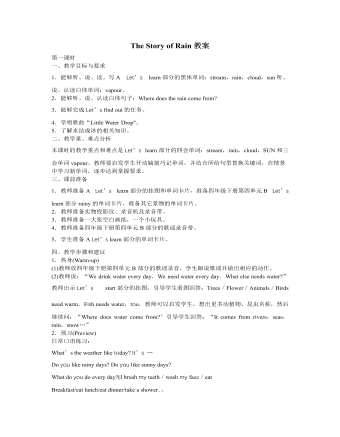
人教版新课标PEP小学英语六年级上册The Story of Rain教案
(2)教师说:“I am going to plant a flower on the weekend.But I don’t know hoⅥ do that.Can you tell me? Who knows?”教师提示学生可以适当用中文解释。如果有学生举手,教师就问:“OK.How d0 you do that?”引导学生回答。“First,put the seeds in the soil.”然后,教师接着说:“What should I do then? 引导学生回答“Water it. (3)教师说:“Zhang Peng is talking to h is teacher.Now Let’s see what they talking about.”学生翻开学生用书,教师放录音,学生跟读。教师解释In several days的意思是几天以后。”教师板书四会句型:How do you do that? What should you do then?学生仿写。 (4)同桌学生进行对话替换操练,可以谈论西瓜(watermelon)、小麦(wheat)等植物的种植过程。然后选几组在班上表演对话。 (5)教师指导学生运用主句型编对话。以下对话供参考: A:How do you clean the classroom? B:First.sweep the floor. A:What should you do after that? B:Then clean the desks and chairs.wash the windows. 4.巩固和延伸(Consolidation and extension) (1)做本单元B Let’s talk部分的活动手册配套练习。
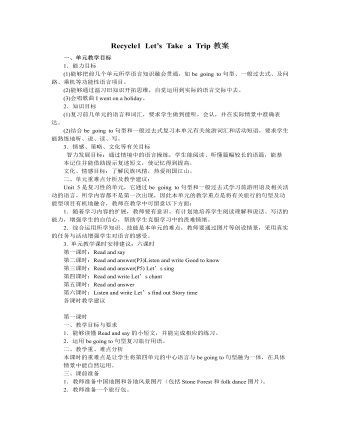
人教版新课标PEP小学英语六年级下册Recycle1 Let’s Take a Trip教案
4.巩固和扩展(Consolidation and extension) (1) 做本单元活动手册配套练习。 (2) 翻卡片说单词。学生两人一组,把单词卡片反面朝上放在桌子上,然后同时翻开两张单词卡(如:going, holiday),就马上组织成一句话(如:Where are you going on the holiday?/ I’m going to Kunming this holiday.),说得快又正确者为胜。 (3) 教师播放C部分Story time的录音或VCD,帮助学生理解故事内容。学生再听一遍录音,跟读故事里的句子,教师指导学生发音。 (4) Bright eyes. 在黑板上张贴Let’s find out的8幅图片,Mike, Zhang Peng, Sarah, Kathy等4个人物图片分别放在8幅图片上,如:Mike ---take pictures---buy presents。学生仔细观察后,请学生闭上眼睛,教师就趁学生闭眼之际交换人物位置(如把Mike放到eat noodles),然后请学生张开眼睛回答:What did Mike do just now ? 引导学生回答: Mike took pictures and bought presents. 教学参考资料库 1.文化背景介绍: 机场标志: Airport 飞机场 Airport lounges 机场休息室Airports shuttle 机场班车 Arrivals 进港Assistance 问讯处Check in area (zone) 办理登机区Departure airport 离港时间Departure times on reverse 返航时间 Welcome aboard 欢迎登机
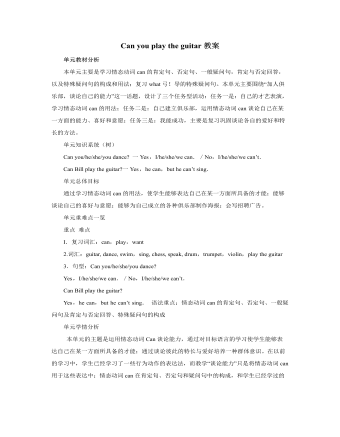
人教版新目标初中英语七年级上册Can you play the guitar教案
本单元主要是学习情态动词can的肯定句、否定句、一般疑问句,肯定与否定回答,以及特殊疑问句的构成和用法;复习what弓!导的特殊疑问句。本单元主要围绕“加人俱乐部,谈论自己的能力”这一话题,设计了三个任务型活动:任务一是:自己的才艺表演,学习情态动词can的用法;任务二是:自己建立俱乐部,运用情态动词can谈论自己在某一方面的能力、喜好和意愿;任务三是:我能成功,主要是复习巩固谈论各自的爱好和特长的方法。单元知识系统(树)Can you/he/she/you dance? 一Yes,I/he/she/we can./No,I/he/she/we can’t.Can Bill play the guitar?一Yes,he can,but he can’t sing.单元总体目标通过学习情态动词can的用法,使学生能够表达自己在某一方面所具备的才能;能够谈论自己的喜好与意愿;能够为自己成立的各种俱乐部制作海报;会写招聘广告。单元重难点一览重点 难点I.复习词汇:can,play,want2.词汇:guitar, dance, swim,sing, chess, speak, drum,trumpet,violin,play the guitar3.句型:Can you/he/she/you dance?Yes,I/he/she/we can./No,I/he/she/we can’t.Can Bill play the guitar?
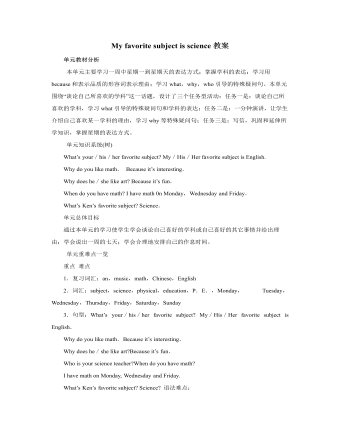
人教版新目标初中英语七年级上册My favorite subject is science教案
本单元主要学习一周中星期一到星期天的表达方式;掌握学科的表达;学习用because和表示品质的形容词表示理由;学习what,why,who引导的特殊疑问句。本单元围绕“谈论自己所喜欢的学科”这一话题,设计了三个任务型活动:任务一是:谈论自己所喜欢的学科,学习what引导的特殊疑问句和学科的表达;任务二是:一分钟演讲,让学生介绍自己喜欢某一学科的理由,学习why等特殊疑问句;任务三是:写信,巩固和延伸所学知识,掌握星期的表达方式。单元知识系统(树)What’s your/his/her favorite subject? My/His/Her favorite subject is English.Why do you like math. Because it’s interesting.Why does he/she like art? Because it’s fun.When do you have math? I have math 0n Monday,Wednesday and Friday.What’s Ken’s favorite subject? Science.单元总体目标通过本单元的学习使学生学会谈论自己喜好的学科或自己喜好的其它事情并给出理由;学会说出一周的七天;学会合理地安排自己的作息时间。

人教版新目标初中英语七年级下册How was your weekend教案2篇
Teaching Goal:1. General aims:Talk about recent past events2. Particular aims:A. Language Focus.Talk about recent past events and think of the past events.B. Language goalsHow was….?It was …What did …do over the weekend?C. Language structures:(1). How was your weekend? I was great. Pay attention to no form.(2). What did you do over the weekend? I played soccer. We went to the beach.D. Useful words and phrases:Words: was, did, went, beach, over, project, test, wasn’t, false, number, geography, spend, week, most, mixture, their, had, little, cook, read, saw, change, everyone, sit, sat, no, anythingPhrases: did one’s homework, played soccer, cleaned my room, went to the beach, played tennis, went to the movies, on Saturday morning, over the weekend, cook … for, what about, do some reading, have a party, talk show, go shoppingE. Grammar language:Present simple past tenseRegular and irregular verbsF. Learning strategies:Tour and holidaysG. Interdiscipinary:H. Emotion and manner:Teaching time: 5 periodsTeaching procedures:Period One教学步骤、时间 教师活动 学生活动 媒体应用Step 1Free talk 3’ Ask some questions like:Who’s on duty today?What’s the weather like? Answer and talk about something.让同学们回答下列问题1. Do you like weekend? (Let some students answer)It takes them three minutes to talk about the question.2. Why do you like weekend? (let the students answer) Most of the students like the weekend此时教师用汉语问:“在周末期间问你干了什么?这句话用英语这么回答?Let the students guess.At last the teacher give them right answer3. What did you do over the weekend?(板书、学习)

人教版新目标初中英语七年级下册Where is the post office教案2篇
Period 2 (3a----Section B 2c)Preview(Pre-task): Key points: What laAdd another information about their pen pals----their language on the cardnguage does she/he speak?She/He speaks....Does she/he have any brothers and sisters? Does she/he speak English?Preview(Pre-task): Add another information about their pen pals----their language on the cardKey points: What language does she/he speak?She/He speaks....Does she/he have any brothers and sisters? Does she/he speak English?Step 1 Revision1.Revisionand dictation of the new words 2.Revise the drills they learned yesterday.(by pairwork and grammar exercise)Step 2 Leading-inT has a conversation with one student. The conversation is following:---Do you have a pen pal?---Yes, I do.---What's your pen pal's name? ---His/Her name is....---Where is your pen pal from? ---He/She is from...---Where does he/she live? ---He/She lives in....---What language does he/she speak?He/She speaks...Write the new words on the Bb. They are following: EnglishChineseJapaneseFrenchStep 3 LearnLearn the new words with the whole class.Finish 3a with the students3b Pairwork T still does an example with one student Then the Ss practise in pairs. The example is following:--Curry Muray is my pen pal. He is from the United States.---What language does he speak?
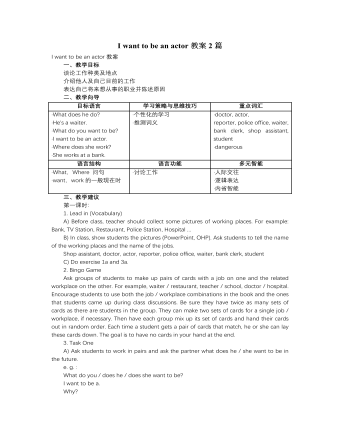
人教版新目标初中英语七年级下册I want to be an actor教案2篇
三、教学建议第一课时:1. Lead in (Vocabulary)A) Before class, teacher should collect some pictures of working places. For example: Bank, TV Station, Restaurant, Police Station, Hospital ...B) In class, show students the pictures (PowerPoint, OHP). Ask students to tell the name of the working places and the name of the jobs.Shop assistant, doctor, actor, reporter, police office, waiter, bank clerk, studentC) Do exercise 1a and 3a.2. Bingo GameAsk groups of students to make up pairs of cards with a job on one and the related workplace on the other. For example, waiter / restaurant, teacher / school, doctor / hospital. Encourage students to use both the job / workplace combinations in the book and the ones that students came up during class discussions. Be sure they have twice as many sets of cards as there are students in the group. They can make two sets of cards for a single job / workplace, if necessary. Then have each group mix up its set of cards and hand their cards out in random order. Each time a student gets a pair of cards that match, he or she can lay these cards down. The goal is to have no cards in your hand at the end.3. Task OneA) Ask students to work in pairs and ask the partner what does he / she want to be in the future.e. g. :What do you / does he / does she want to be?I want to be a.Why?Because it's (adj).B) Vocabulary: Section B, 1a4. Homework 1.2.